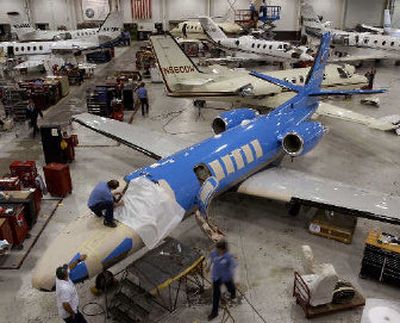Turbulent aircraft industry shaking up organized labor

WICHITA, Kan. — Already reeling from layoffs that slashed their ranks, unions representing this city’s aircraft workers must now grapple with a new workplace reality after the sale of the Boeing Co.’s commercial airplane operations in Kansas and Oklahoma to a Canadian firm.
Fearing for their jobs, aircraft workers are more open to helping their employers reduce labor costs and bring new work to production lines. Some are growing leery of unions, spurning efforts to unionize one plant and trying to decertify an existing union in another plant.
The aircraft unions are facing the same harsh environment that last week led to the fracture of the AFL-CIO, the country’s largest union federation, and the defection of 3.2 million members of the Teamsters and Service Employees International Union. Those dissidents want to focus away from electoral politics and more on finding new members to replenish the unions’ falling ranks.
“It is very clear in other industries, (unions) have lost a lot of power — most notably in airlines and certainly other manufacturing sectors. Aerospace unions are probably reading the handwriting on the wall,” said Richard Aboulafia, vice president of analysis at the Fairfax, VA-based Teal Group.
Wichita — which calls itself the air capital of the world — is home to manufacturing plants for Boeing, Cessna Aircraft, Bombardier Aerospace and Raytheon Aircraft, along with more than 60 aviation subcontractors. The industry makes up 16 percent of Wichita’s employment, down from 26 percent before Sept. 11, 2001.
Even with the aviation sector recovering, many lucrative aircraft jobs are permanently gone — victims of outsourcing overseas, technological advances and leaner production lines.
Still, Aboulafia said he was “shocked” at the extent of concessions Onex Corp. has been able to get so far from former Boeing workers.
“You can’t fault anyone,” said Bob Brewer, Midwest director for the Society of Professional Engineering Employees in Aerospace. “We lost some ground. Anytime you go through a divestiture you are bound to be involved in concessionary bargaining — and that is not a good position to be in.”
Onex’s aerospace subsidiary, recently renamed Spirit Aerosystems Inc., won pay and benefit cuts from its biggest union, the International Association of Machinists and Aerospace Workers; as well as the International Brotherhood of Electrical Workers. SPEEA, its second-largest union, also approved benefit cuts coupled with wage increases for its two negotiating units.
The last remaining contract to settle is with the United Automobile, Aerospace and Agricultural Implement Workers of America locals in Tulsa, Okla., and McAlester, Okla., whose members remained on the job but rejected a contract offer that cut their pay by 10 percent. Negotiations have not yet resumed.
“It is tough times, no doubt, for labor in general. It is not just the unions — it’s for anybody out there working. It’s bad,” said Garland “Bear” Moore, business representative for the IAMAW. He denied unions are losing power, but acknowledged it has been a “tough row” for the nation’s workers.
Spirit Aerosystems spokesman Fred Solis said the company is not trying to break the unions, and is committed to working with them.
The givebacks at Onex are reminiscent of those garnered by another Canadian firm, Bombardier Aerospace, which in 2003 won contract concessions from machinists in exchange, for a pledge to keep its Wichita plant open through at least 2006.
“The militant approach is unproductive,” Aboulafia said of union confrontations with management. “The only way to survive and grow is through cooperation.”
Earlier this year, Cessna Aircraft Co. workers rejected unionizing the plant in Independence, Kan., amid fears the company would build their new Mustang jet elsewhere.
The latest volley comes from technical workers at Spirit Aerosystems who are working to decertify SPEEA, their second such vote in the past 17 months. That vote is scheduled for Aug. 17.
Heidi Foltz, a leader in the decertification effort, said SPEEA creates a divisiveness that hurts morale and runs counter to working with management. Union opponents said they can get a better deal — such as performance bonuses — similar to that of non-represented employees.
“We also have a strong, strong group — they want their own voices back,” said Foltz, who works as a project management specialist at Onex. “We don’t want one or two people speaking on behalf of all of us. We want to be in control of our own destiny.”
SPEEA represents 1,800 technical workers — more than 30 percent of which signed the petition to get the National Labor Relations Board to put the issue up for a decertification vote.
SPEEA — which narrowly survived the last attempt to end its representation in February 2004 — is taking this latest threat very seriously, Brewer said.
“I am actually very confused and concerned,” he said.
SPEEA has been the only union so far to actually win wage increases rather that accept wage cuts from Onex, but the union lost ground on other benefits.
While the loss of 800 machinist jobs during the Boeing sale also cost the union members, the IAMAW says it has been signing up members at Raytheon Aircraft and at Boeing’s remaining defense plant here — both now in the midst of contract negotiations.
Boeing opened talks in June with the IAMAW, which represents about 18,000 employees in Seattle, Wichita and Portland, Ore. A vote is scheduled Sept. 1, when the current contract expires. The company will begin talks in October with SPEEA, its other major union.
“We are holding our own. It is not quite as doom and gloom as everyone is painting it,” Moore said. “We have some issues to get through. This Onex thing is not the prettiest sight in the world, but we are dealing with it.”